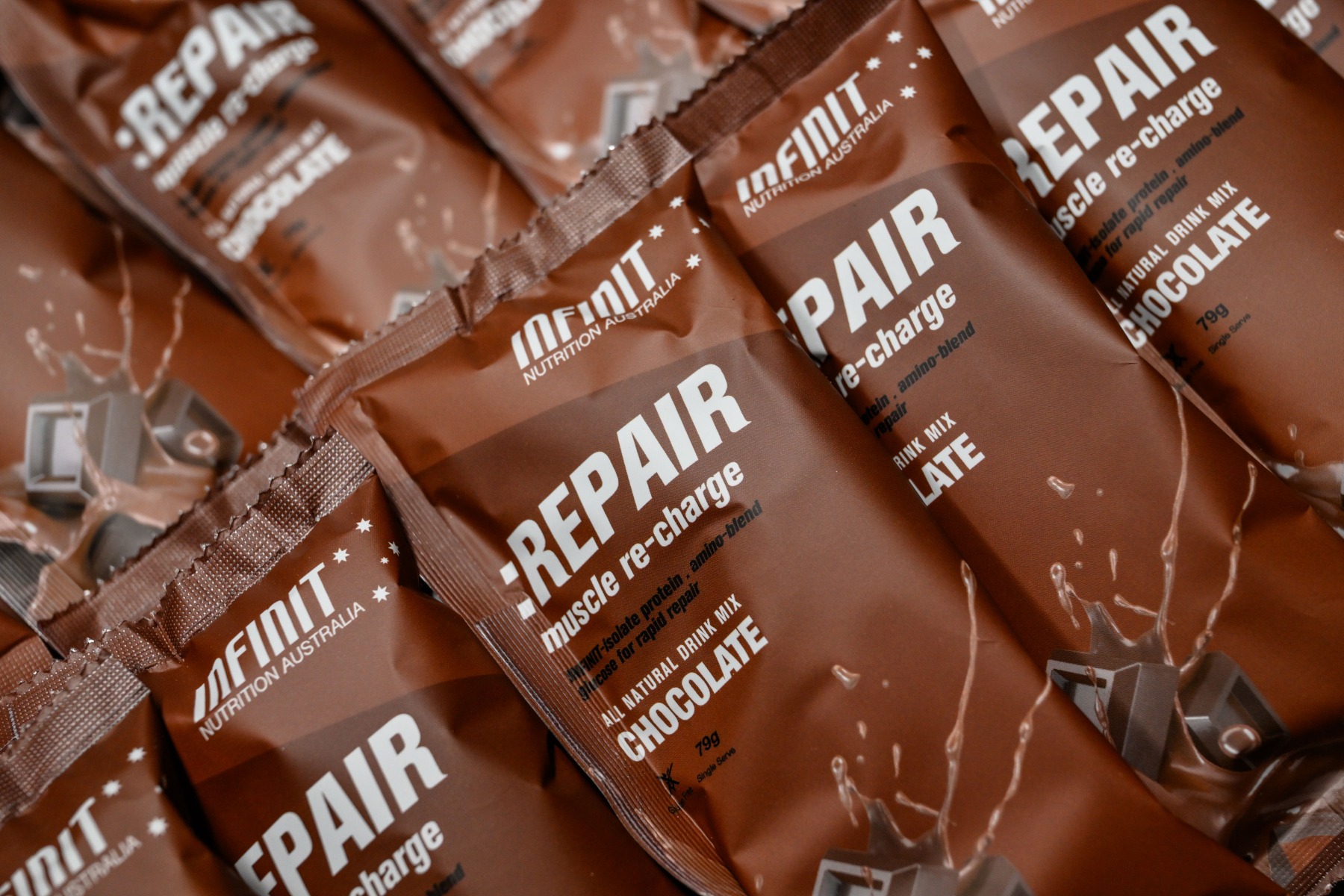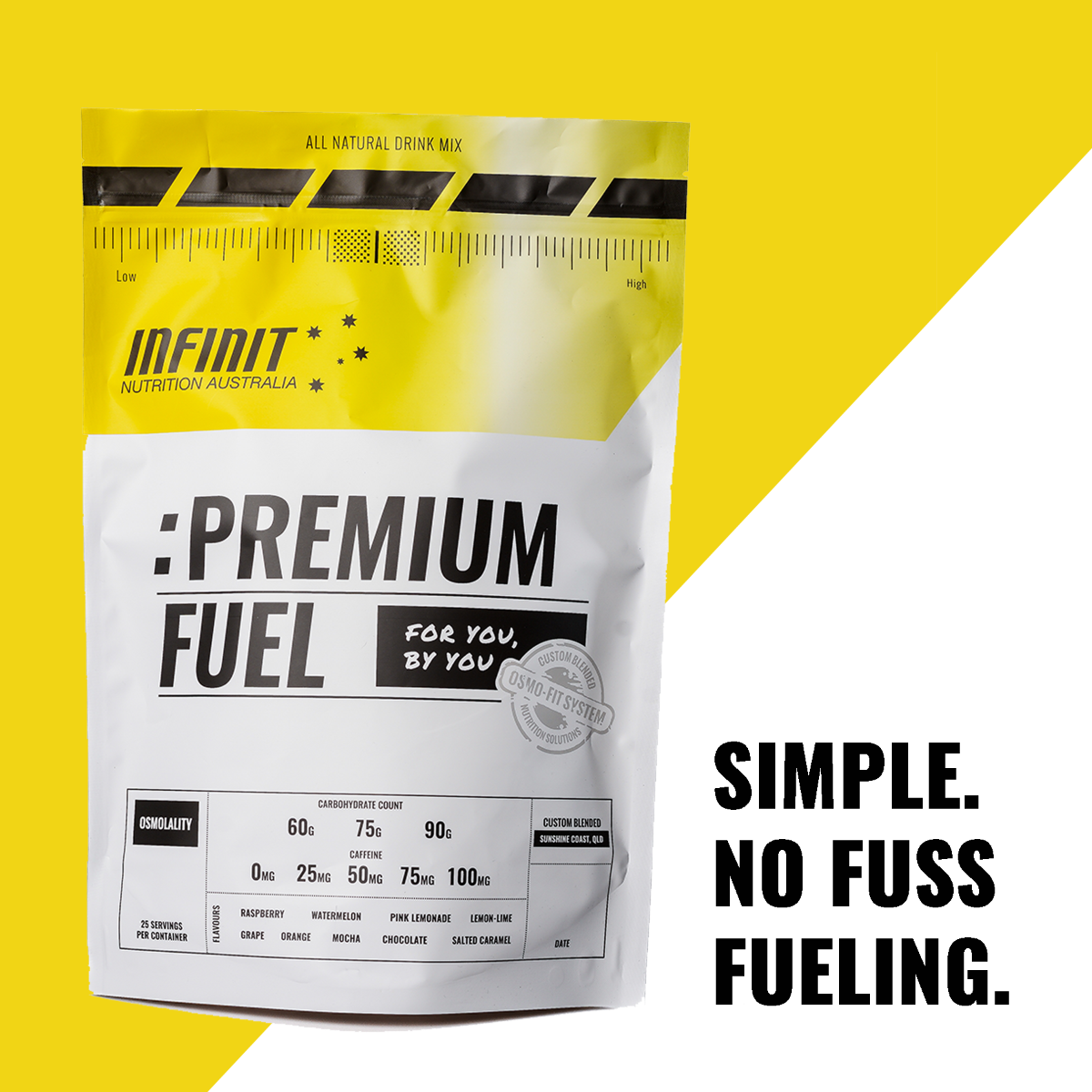Repair - Muscle Recharge
- 19 Feb 2024
Why all the fuss with Recovery?
Endurance athletes push their bodies to the limit, depleting essential nutrients during intense training sessions and races. The key is optimising recovery, which lays in a well rounded approach that goes beyond mere hydration.
Endurance exercise places tremendous stress on the body, depleting energy stores and breaking down muscle tissue if not fueling adequately throughout, and surrounding training sessions. Proper nutrition is vital to optimise post training recovery. Dietary carbohydrates and protein are the most important macronutrients for endurance athletes, working to nourish, rebuild and replenish what the body has depleted over the last few hours.
Infinit Nutrition REPAIR serves as exactly this - the perfect post workout drink formulated with a 4:1 ratio of carbohydrates to protein. This combination of proteins, including the fast absorbing whey, and slower absorbing casein and soy proteins, allows for maximum recovery duration. These proteins supply the body with vital nutrition in a time released fashion for the full utilisation of the post workout anabolic window. The carbohydrates, amino acids and electrolytes in Repair additionally come together to give your body exactly what it needs to rehydrate and prepare for the next session.
Carbohydrates for Recovery:
Firstly, we want to replenish glycogen stores - the body's primary energy source.
To preform at your best it is well known that athletes must ensure that their carbohydrate stores are optimised before, during AND after exercise. This is where REPAIR comes into play. The rate of muscle glycogen resynthesis is shown to be at its greatest 1 hour post exercise. Studies have shown that ingesting carbohydrates immediately after exercise results in approximatly 45% greater rate of glycogen resynthesis over the following 2 hours compared to delaying your intake by 2 hours. This ultimatly translates into a greater net synthesis over a 4 hour recovery period, which can be even more important if you're following up with another session later on in the day.
Repair has been formulated not only to make your nutrition stragety as easy as possible, but to also give your body exactly what it needs to optimise your recovery and thus performance. 300 calories, 15g of protein, 59g of carbohydrates and 250mg of electrolytes mixed in with water or milk to get ahead of your nutrition. Whether you struggle to work up an appetite after training, need something quick on the way to work, or want to get ahead of your recovery - Repair is for you.
Protein for Recovery:
Proteins are made of amino acids, which are the building blocks that help you grow and maintain your body’s tissues. Humans are not able to synthesize (or produce internally) certain amino acids, so they need to be consumed through food. These amino acids that need to come from dietary sources are called essential amino acids. This inability to produce essential amino acids is why the consumption of an adequate amount of high quality protein is vital for your health, epecially as athletes.
It is recommended that average adults get a minimum of 0.8 grams of protein per kilogram of body weight per day. Athletes, on the other hand, should consume higher amounts due to increased needs for muscle repair and training adaptations. The Academy of Nutrition and Dietetics recommends 1.2 to 2.0 grams of protein per kilogram of body weight per day for athletes; depending on training intensity. If you're not consuming enough protein, your body may be giving you different signs that you need to eat more of it. Some of these include: decreased muscle growth or strength, getting sick more often, hunger, fatigue, unhealthy hair, skin, and nails, neurological disruptions, and swelling.
Another sign can be through muscle soreness, some hate it and others love it. Often we think this means more progress "no pain, no gain — Right?" But if you’re suddenly noticing that your body feels more sore than usual, or if you’re experiencing excessive muscle soreness it could be a sign your body is unable to repair and recover itself properly.
Exercise-induced muscle soreness results from microtears. Stress from exercise that is put on the muscles disrupts its normal function. As the muscle is damaged during exercise it can feel painful, the soreness then kicks in after exercise as the body responds to the breakdown. Soreness can be a result of change in exercise, a new form of movement, or poor nutrition. This is a necessary part of the adaptive response that comes from exercise. Activity & the physical stress of training breaks down the body (catabolism) in order for it to rebuild and recover (anabolism) ensuring that it can be better prepared for that stress next time.
This is where Protein and amino acids are essential, giving your body exactly what it needs to proper induce muscle recovery.
Electrolytes for Recovery
INFINIT’s exclusive blend of electrolytes is made up of four salts that match your sweat rate. This is primarily sodium, potassium, calcium and magnesium. Our electrolytes are the most readily absorbable forms and are super important for your hydration. The electrolytes you take in throughout your training puts you in the best position to restore fluid balance, support hydration, and aid in the recovery of depleted energy stores.
Why Repair?
The combination of carbohydrates, protein, amino acids, and electrolytes creates an ideal enviornment for improved nutrient absorption. Nutrient absorption playing a pivitol role in maximising the benefits of a recovery drink. To explain, carbohydrates trigger the release of insulin, a hormone that not only helps in the uptake of glucose by the cells for energy but also facilitiates the absorption of amino acids by muscle tissues. The coordinated response is crucial for replenishing energy stores and initiating the muscle repair process. Not only does this highlight the importance of carbohydrates and amino acids but also protein and carbohydrates.
Electrolytes also play a dual role in enhancing nutritient absorption. For example, sodium helps to facilitate the absorption of glucose and amino acids in the intestines, contributing to overall nutritent uptake. By incorporating a balanced combination of these key componets in a recovery drink like REPAIR, athletes can capitilise on the combination of these nutrients all in one drink. Ultimately, if you want to get the most of your training, recovering adequatly and replenishing the body is vital. The athlete who optimises their post exercise nutrition will be in the best position to maintain or enhance their performance during their next session and beyond.






